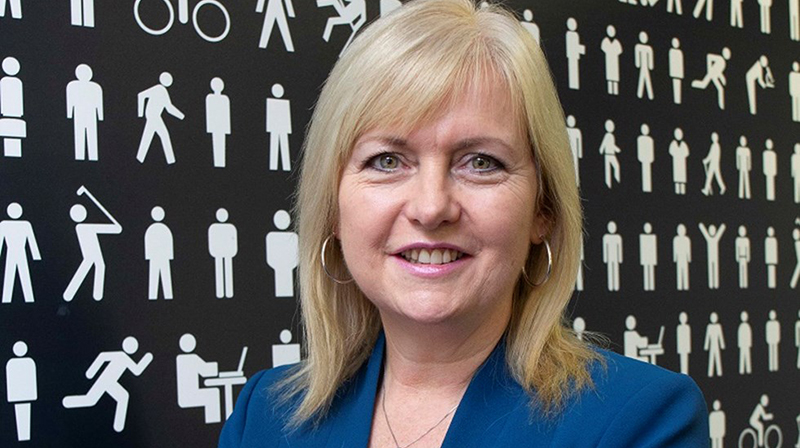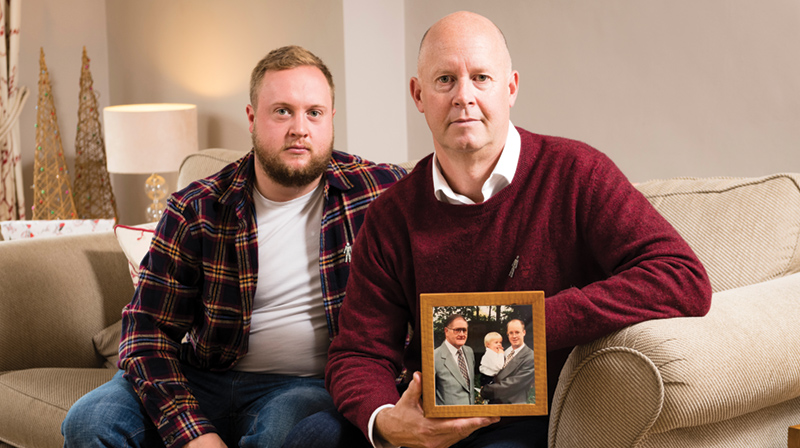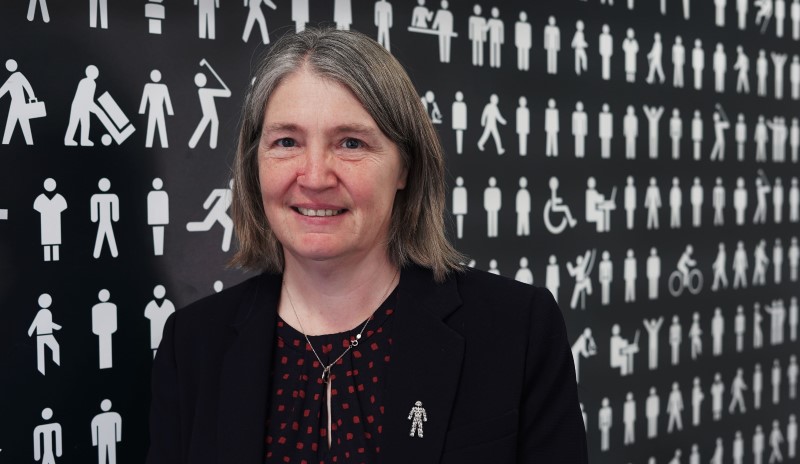The Pioneers Update – December 2021
Celebrating 25 years of progress that you’ve made possible, including new treatment combinations and using gut bugs to prevent treatment-resistant cancers – Angela Culhane

As the year, and my time as Chief Executive comes to a close, I want to say a huge thank you for what you’ve helped us achieve for men in 2021, and for what we’ve achieved together since Prostate Cancer UK was founded back in 1996.
Prostate cancer has affected several people in my family. My father-in-law, Tom and my stepfather, James, both wonderful men, were sadly taken too soon by this disease. I sometimes worry because I know that my husband and son are at higher risk of prostate cancer. I also know they’ll live to see revolutionary changes in care because of the incredible research that you fund.
As we celebrate 25 years of progress, I’m pleased to leave Prostate Cancer UK on a high, especially as we emerge from a very challenging couple of years. It has been the privilege of a lifetime to lead this organisation and I’m so proud of what we’ve achieved for men.
Men like Steve, who was cured of prostate cancer but still suffers side effects. When Steve’s father was diagnosed with prostate cancer 20 years ago, he didn’t speak about it at all; treatments were limited and support barely existed. The picture has changed massively since then, but not enough. Steve hopes his son, who’s also at higher risk because of his family history, won’t have to worry about prostate cancer at all.

“It makes me realise how far treatment has come - my father had radiotherapy too, but it wasn’t able to cure him. His disease returned a few years later, and this time there weren’t any treatment options left for him.”
Steve Adcock
Steve says, “By the time I was treated the technology had massively improved. 20 years ago, they wouldn’t have known how aggressive his cancer was and how much radiotherapy was needed to kill it. But for me, they could help tailor my treatment and deliver the intense dose that I needed, even if it did leave me with bad side effects. That’s why it’s so important we fund research. We’ve seen how much things can improve thanks to research.”
As we look to the future, I’m delighted to welcome Laura Kerby who’ll join us as our new Chief Executive in February 2022. With a wealth of experience and a passion for health, Laura joins us from Myeloma UK, where she has been Chief Executive. She’s previously also led the charity Penny Brohn UK for six years and before that, she sat on the executive board of Nuffield.

Laura was motivated to join us by her own father’s experience of prostate cancer and her passionate belief that by working together, we’ll stop prostate cancer being a killer. I couldn’t agree more, and I look forward to continuing to be part of this movement as a huge supporter of Prostate Cancer UK.
As I pass the baton to Laura, I want to thank you again for everything the Pioneers do for men and their families and the vital role you play in funding research to find better, more accurate tests and life-saving treatments.
I hope you and your loved ones have a very enjoyable holiday period.
Angela Culhane
Chief Executive
Combining existing treatments can improve survival in men with localised and advanced prostate cancer

Compelling results from two major trials presented at a European research conference could change the way we treat prostate cancer.
As well as developing new treatments, another way we’re trying to speed up progress against prostate cancer is by trialling existing treatment combinations at different stages of the disease. Two exciting trials in this area, PEACE-1 and STAMPEDE, had results presented by researchers at the ESMO (European Society for Medical Oncology) annual conference in September and the great news is that both have shown significant benefit compared to standard treatments.
PEACE-1 trial: new combinations to treat advanced prostate cancer
In recent years, several new treatments have been approved for hormone-sensitive advanced prostate cancer - including docetaxel chemotherapy and abiraterone, a new type of hormone therapy - which have significantly improved life expectancy. The results from the PEACE-1 trial take this one step further and show that, by giving both drugs at the same time alongside traditional hormone therapy, we could extend the lives of men with advanced disease by up to 18 months.
With two of these treatments already off-patent and one due to follow in the next 18 months, this should not only prove very beneficial for men but affordable for the NHS as well.
“Prostate cancer research has made great strides in recent years in improving treatments for men with advanced prostate cancer. This study builds on that progress and shows that combining several new treatments can give men up to 18 months of additional life. This will make a huge difference for these men, and if the full results confirm these findings, we want to see this combination approved on the NHS as quickly as possible.”
Dr Matthew Hobbs, Director of Research
STAMPEDE trial: new combinations to treat aggressive, localised prostate cancer
Abiraterone is currently only used once cancer has spread and is not responding to other hormone therapies. But the latest results from the STAMPEDE trial show that giving abiraterone to men with localised disease that’s at high risk of spreading, significantly reduced the number of men whose cancer did spread. Crucially, it also reduced the number who died from prostate cancer within six years by more than half (from 15% to 7%).
It’s thanks to the Pioneers’ support, that we’re able to fund and support innovations like these. We’ve invested over £2.5m into the STAMPEDE researchers across four different grants to analyse data, samples, and images from that trial to work out exactly which men will benefit most.
It’s hugely encouraging to see such progress and improvements to treating prostate cancer that will give men longer with their loved ones. We know that with sustained funding for research, we can drive even more progress from these clinical trials, and many others.
Using gut bugs to stop prostate cancer becoming resistant to treatments

This ground-breaking study made possible thanks to your support, provides the first-ever clues as to how gut bacteria might play a role in cancer growth.
While gut bacteria play an essential role in our health, prostate cancer can influence the balance between helpful and potentially harmful microbes, as well as the toxins they produce. Researchers led by Prof Johann de Bono found that hormone therapy, the standard treatment for men with advanced prostate cancer, can trigger gut bacteria to produce androgen hormones. Androgens can drive cancer growth and treatment resistance, worsening men’s survival outcomes.
By manipulating the gut bacteria in mice with prostate cancer, researchers found that getting rid of gut bacteria slowed cancer from growing and developing treatment resistance. They also saw that transplanting gut bacteria from mice with prostate cancer that had become resistant to treatment into mice that had not yet developed resistance, encouraged cancer growth.
What do these findings mean for men?
The study also analysed the gut bacteria from men undergoing treatment at the Royal Marsden Hospital in London and was able to distinguish between potentially harmful as well as favourable “bacterial fingerprints”. While the study is still in its early stages, researchers hope to use the presence of harmful bacterial fingerprints to help identify which men are at high risk of developing resistance to treatment. These men could benefit from strategies to manipulate their gut bacteria with more favourable bacteria, such as stool transplants or even an innovative yoghurt drink.
“In the long-term, our aim would be to produce a yoghurt enriched with favourable bacteria to prevent resistance to treatment.”
Prof Johann de Bono
It’s thanks to your support that we’re able to fund innovative, boundary-pushing research. This study opens a new avenue to explore for the treatment of prostate cancer, which has the potential to make a huge difference to men.
Past, Present and Future: Prostate Cancer UK at 25

In October, we held our 25 years of Prostate Cancer UK event to thank supporters that have played a crucial part in our history. Together, we reflected on our past successes, remembered the men lost too soon to prostate cancer and celebrated the lives that have been saved because of your contribution and support.
On the night, we heard from men and their families affected by prostate cancer and the researchers who are working tirelessly towards better treatments and cures.
We spoke with some of our supporters, including Lady Joy Bourne, Vice President of Prostate Cancer UK and fellow Pioneer, about our biggest achievements and their hope for the future of prostate cancer care.
Save the date: The Panel 2022

Thursday 24 March 2022, from 6.30pm – 10pm at Royal College of Physicians, Regent’s Park, London.
Join us for the return of our annual event, to hear from world-leading researchers who are finding new, more accurate ways to diagnose prostate cancer and working to change practice globally.
Hosted by Mark Emberton, Professor of Interventional Oncology at University College London, the evening will consist of a drinks reception and a lively panel discussion, followed by a three-course dinner.
Formal invitations to follow in the new year. To RSVP and for more information please contact the Pioneers team.

